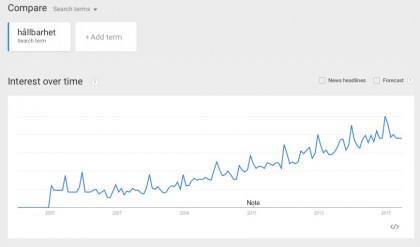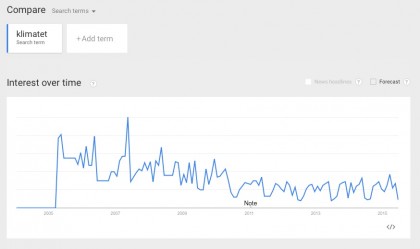At Almedalen today Vi Skogen presented an analysis of media coverage of climate change over the last ten years. The analysis confirmed what Vi Skogen suspected: coverage of climate change in the Swedish press has declined since 2009.
The report’s authors suggest several possible explanations, including diversion of attention to other topics and significant reduction in the number of specialist reporters. And the Editor-in-chief of Svenska Dagbladet commented during the seminar that the media responds to readers’ interests – fewer articles are written on topics in which little interest is shown.
But is it true that readers are less and less interested in climate change? For a quick comparison I checked Google Trends. Searches on ”klimat,” ”klimatet” and ”klimatföränding” revealed that the number of searches on each of these terms has indeed declined over the last five years.
It seems that the reality of climate change has become so accepted in Sweden that it’s no longer news. Even coverage of weather-related catastrophes decreased between 2005 and 2015. Unfortunately, as the Vi Skogen report concludes ”nyhetsvärdet för klimatfrågor inte stiger i samma takt som medeltemperaturen.”
But interest in ”hållbarhet” is increasing. In the 2013 Almedalen programme, ”hållbarhet” wasn’t even listed as a event topic, in 2014 there were 261 events on ”hållbarhet”, and this year there were 379. Google Trends shows a similar picture:
 This slant on climate change is gaining media space. It may not be so easy today to get the Swedish public’s attention on the impacts of climate change in East Africa, but there is increasing interest in sustainable ways forward. The good news is that Vi Skogen, ZeroMission and many others have good solutions and stories to talk about.
This slant on climate change is gaining media space. It may not be so easy today to get the Swedish public’s attention on the impacts of climate change in East Africa, but there is increasing interest in sustainable ways forward. The good news is that Vi Skogen, ZeroMission and many others have good solutions and stories to talk about.

 Gästbloggare
Gästbloggare


Thank you Claire,
Agree! There are manu good Storfors to be Rolf!
The full report Cannes downloaded from Our web page
http://www.viskogen.se/wp-content/uploads/2015/06/varmare_klimat_iskall_-nyhet.pdf
Thank you Claire,
Agree! There are manu good Stories to be told!
The full report Cannes downloaded from Our web page
http://www.viskogen.se/wp-content/uploads/2015/06/varmare_klimat_iskall_-nyhet.pdf
Interesting report, indeed!
My master thesis, which recently was published, might be of interest. The report described how carbon offsetting and carbon trading are presented in Swedish newspapers.
The results show that:
Politicians (liberal/conservative in particular) have the greatest say in the debate.
The number of articles decreased between 2007 and 2014, but the articles were in 2014 longer and often ideological in their character.
Check it out at: http://www.diva-portal.org/smash/get/diva2:819436/FULLTEXT01.pdf
Many thanks Samuel.
I read your thesis with interest, especially the discussion about whether/how the Swedish newspapers have connected carbon offsetting with sustainable development.
The carbon offsetting projects our customers support contributed to many of the proposed UN Sustainable Development Goals directly, and to others indirectly.